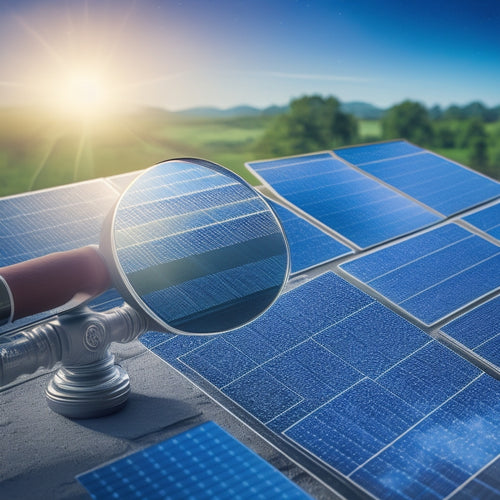
Top Picks for Small Home Energy Efficiency
Share
When maximizing small home energy efficiency, choosing the right solar panel system is essential. You'll want to explore top brands like Panasonic, SunPower, and Tesla, considering reliable performance, durability, and extensive warranties. Prioritize features like efficiency rating, power output, and energy tracking, and research local pricing and incentives to maximize savings. Don't forget to select a high-quality inverter that guarantees maximum energy harvesting and minimal losses. By focusing on careful planning and execution, you'll be well on your way to significant energy cost savings and a reduced carbon footprint. And there's more to explore to optimize your small home energy efficiency.
Key Takeaways
• Choose top-rated solar panel brands like Panasonic, SunPower, and Tesla for reliable performance and durable designs.
• Prioritize high-efficiency solar panels with advanced features like energy tracking for optimized energy output.
• Opt for high-quality solar inverters with advanced features like energy monitoring for maximum energy harvesting and minimal losses.
• Ensure a safe and efficient installation by carefully planning and executing the process, considering roof structure and shading.
• Consider local incentives and tax credits to offset costs and maximize savings on small home energy efficiency solutions.
Best Residential Solar Panel Brands
When shopping for residential solar panels, you'll want to explore top brands that offer high-quality products, reliable performance, and durable designs. After all, you're making a significant investment in your home's energy efficiency.
A reputable brand with a solid warranty can give you peace of mind and protect your wallet in the long run. Look for brands with a strong reputation, like Panasonic, SunPower, and Tesla, which offer extensive warranties that cover their solar panels for 25 years or more. A lengthy warranty period indicates a brand's confidence in their product's performance and durability.
Additionally, a well-established brand with a proven track record is more likely to be around in 10-15 years to honor their warranty claims. Don't settle for anything less than a brand that stands behind their product. Your wallet (and the environment) will thank you.
Top Solar Panel Features Compared
As you navigate the solar panel market, you'll encounter a range of features that can make or break your energy-harvesting experience, from power output and efficiency ratings to durability and temperature coefficients. It's important to prioritize the features that matter most to you.
Here's a snapshot of how top solar panels compare:
| Feature | Panel A | Panel B | Panel C |
|---|---|---|---|
| Efficiency Rating | 20.5% | 21.2% | 20.1% |
| Power Output (W) | 370 | 400 | 360 |
| Panel Durability | 30-year warranty | 25-year warranty | 30-year warranty |
| Energy Tracking | Integrated monitoring | Optional upgrade | Integrated monitoring |
When evaluating solar panels, consider Panel Durability as an important factor, as it directly impacts the panel's lifespan and performance. Energy Tracking is another essential feature, allowing you to monitor your energy production and optimize your system's performance. By weighing these features, you'll find the perfect solar panel for your small home energy efficiency needs.
Residential Solar Panel Cost Factors
Taking into account several factors that impact the cost of residential solar panels is crucial, including the type and quality of equipment, installation costs, and local incentives.
The type of solar panels you choose can greatly influence the overall cost. High-efficiency panels may be more expensive upfront, but they can generate more power per hour of sunlight.
Installation costs vary depending on the complexity of the installation, the size of the system, and the installer's rates.
Local incentives, such as Government incentives and tax credits, can help offset the cost. Additionally, Local pricing for solar panels can vary significantly depending on your location.
Some states offer rebates or tax credits for installing solar panels, which can reduce the upfront cost. It's important to research the incentives available in your area to maximize your savings.
Energy Efficiency With Solar Inverters
Optimizing your solar panel system's energy efficiency hinges on selecting the appropriate solar inverter, which plays a pivotal role in converting DC power from your panels into usable AC power for your home.
You're basically choosing the brain of your solar operation, so it's imperative to get it right. A high-quality inverter will guarantee maximum energy harvesting and minimal losses.
Look for inverters with advanced features like energy monitoring, which allows you to track your energy production and consumption in real-time. This will help you identify areas for improvement and optimize your energy usage.
Additionally, consider inverters that are Smart Grid-ready, enabling seamless integration with the grid and ensuring a smooth shift to a more efficient energy future.
By choosing the right inverter, you'll be well on your way to maximizing your solar panel system's energy efficiency and reducing your carbon footprint.
Small Home Solar Panel Installation
With your solar panel system's brain, the inverter, in place, it's time to focus on the physical installation of your small home solar panel system, which requires careful planning and execution to establish a safe and efficient energy-harvesting setup.
As you begin on this journey, you'll encounter Roof Considerations that'll make or break your solar panel installation. Confirm your roof is structurally sound, and consider factors like shading, orientation, and ventilation to maximize energy output.
When it comes to Installation Challenges, be prepared to tackle obstacles like maneuvering through complex roofing materials, dealing with pesky tree branches, and maneuvering around architectural obstacles. Don't forget to inspect your roof for signs of wear and tear, and address any necessary repairs before installing your solar panels.
Frequently Asked Questions
Can I Install Solar Panels on a Shaded Roof?
You can install solar panels on a shaded roof, but it's important to assess the impact of shade on energy production. Consider the roof orientation and trim trees to minimize shade, ensuring efficient energy harvesting.
Do Solar Panels Work During Power Outages?
You're wondering if solar panels work during power outages? Unfortunately, they don't, unless you have a grid backup system with energy storage and advanced inverter technology, which provides backup power and emergency systems, keeping the lights on when the grid goes dark!
Are Solar Panels Durable in Extreme Weather?
You're wondering if solar panels can withstand extreme weather? Rest assured, they're built to last! Modern solar panels boast impressive weather resistance and climate endurance, shrugging off scorching heat, freezing temps, and even fierce storms.
Can I Add Solar Panels to an Existing Roof?
Before adding solar panels, you'll want to assess your existing roof's condition, ensuring its structural integrity can support the added weight and stress; a thorough inspection will reveal if your roof is ready for the solar panel upgrade.
Are Solar Panels Noisy During Operation?
"You'll be relieved to know that solar panels are virtually silent during operation, producing minimal noise levels. So, go ahead and harness that energy without worrying about a racket, and enjoy the quiet process of energy harvesting!"
Related Posts
-

Solar Panel System Certification Costs: A 10-Point Breakdown
You're looking to understand the costs associated with solar panel system certification. Your total certification cos...
-

5 Ways Bike Sharing Boosts Urban Sustainability
As you explore bike-sharing options, you'll discover five ways it boosts urban sustainability. By reducing congestion...
-

What Role Do Unicycles Play in Urban Transport?
As you navigate through congested city streets, unicycles emerge as a viable solution, slashing carbon emissions by u...


